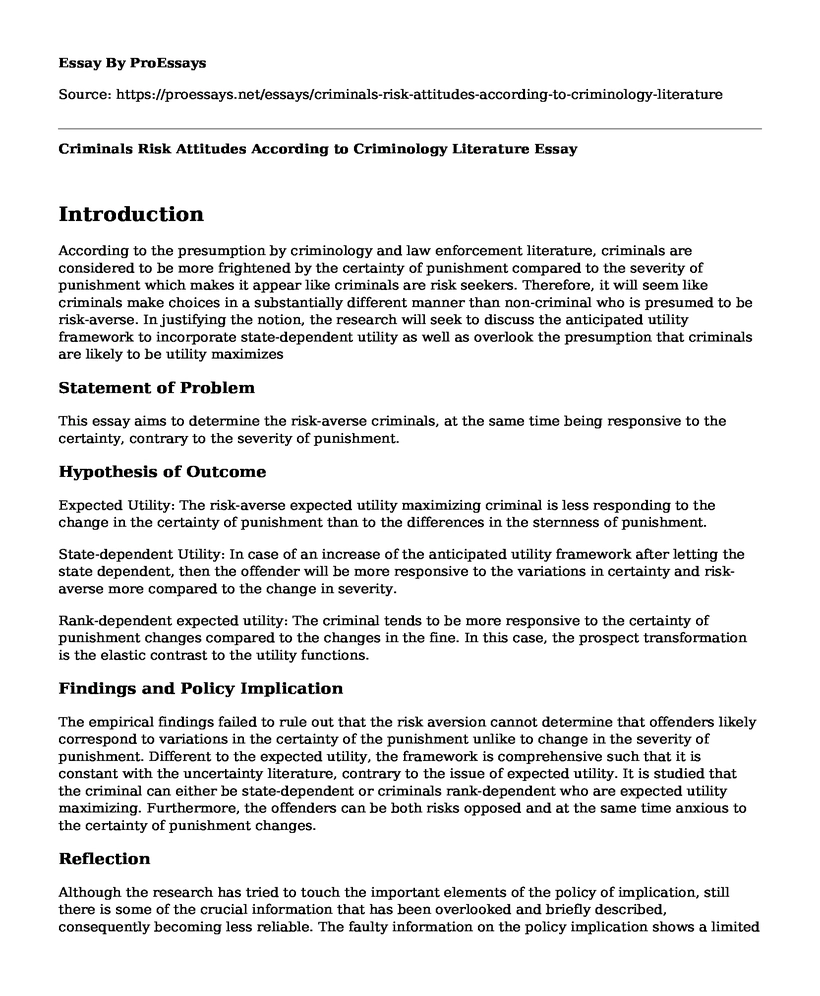Introduction
According to the presumption by criminology and law enforcement literature, criminals are considered to be more frightened by the certainty of punishment compared to the severity of punishment which makes it appear like criminals are risk seekers. Therefore, it will seem like criminals make choices in a substantially different manner than non-criminal who is presumed to be risk-averse. In justifying the notion, the research will seek to discuss the anticipated utility framework to incorporate state-dependent utility as well as overlook the presumption that criminals are likely to be utility maximizes
Statement of Problem
This essay aims to determine the risk-averse criminals, at the same time being responsive to the certainty, contrary to the severity of punishment.
Hypothesis of Outcome
Expected Utility: The risk-averse expected utility maximizing criminal is less responding to the change in the certainty of punishment than to the differences in the sternness of punishment.
State-dependent Utility: In case of an increase of the anticipated utility framework after letting the state dependent, then the offender will be more responsive to the variations in certainty and risk-averse more compared to the change in severity.
Rank-dependent expected utility: The criminal tends to be more responsive to the certainty of punishment changes compared to the changes in the fine. In this case, the prospect transformation is the elastic contrast to the utility functions.
Findings and Policy Implication
The empirical findings failed to rule out that the risk aversion cannot determine that offenders likely correspond to variations in the certainty of the punishment unlike to change in the severity of punishment. Different to the expected utility, the framework is comprehensive such that it is constant with the uncertainty literature, contrary to the issue of expected utility. It is studied that the criminal can either be state-dependent or criminals rank-dependent who are expected utility maximizing. Furthermore, the offenders can be both risks opposed and at the same time anxious to the certainty of punishment changes.
Reflection
Although the research has tried to touch the important elements of the policy of implication, still there is some of the crucial information that has been overlooked and briefly described, consequently becoming less reliable. The faulty information on the policy implication shows a limited understanding of the criminals' attitudes for the sake of designing most excellent law enforcement methods, plea, punishment procedure as well as proof of standard.
The research lacked the term Certainty Aversion Presumption which guides the core basis of the research. The article could have applied the Risk & Lottery theory to demonstrate the risk aversion in criminal. And there was not an empirical discussion of certainty of presumption on the repeated offenders v. first-time offenders. Neilson and Winter (2014) theory could have been supplemented in the discussion, which makes criminals different from the ordinary population since the rest of the study have established that law-abiding citizen incline to be risk-averse. Also, this research has failed to give an extensive application of the policy of implication on the contemporary economy. There are no direct examples or relation to the dynamic economic issues and hence becoming complex and less sensible. The issues mentioned regarding the weakness of the research makes it less reliable and concise in the policy of implication concerning the economic world.
Reference
Neilson, W. S., & Winter, H. (1997). On criminals' risk attitudes. Economics Letters, 55(1), 97-102.
Cite this page
Criminals Risk Attitudes According to Criminology Literature. (2022, Feb 17). Retrieved from https://proessays.net/essays/criminals-risk-attitudes-according-to-criminology-literature
If you are the original author of this essay and no longer wish to have it published on the ProEssays website, please click below to request its removal:
- Book Review Example: Old and New Prisons
- Articles Analysis Essay on Street Crime and White-Collar Crime
- Legalizing Marijuana is Harmful to the Americans Essay
- Can the Juvenile Justice System Meet the Goals of Both Treatment and Punishment?
- Social Work Intervention Paper Example
- Essay Sample on Secure Courtrooms: Deterring Potential Threats
- Essay Sample on UN Security Council: Maintaining World Peace & Security







